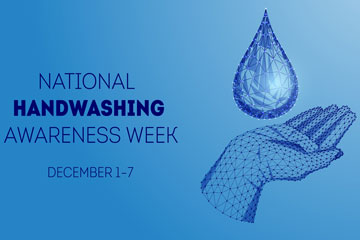Personal hygiene starts and ends with our hands. National Handwashing Awareness Week, celebrated from December 1-7, is sponsored by Henry the Hand Foundation to remind everyone to stay vigilant about hand-washing. It reminds people that germs washing hands with soap and clean water is an effective way to prevent infections and disease. Washing hands regularly is one of the best methods to remove germs, prevent illness and avoid the spread of germs to others. With the COVID-19 outbreak, health vigilantes are focusing a great deal on spreading the word about the importance keeping hands clean to prevent the virus from spreading.
According to the American Cleaning Institute, the goal of National Handwashing Week is to “decrease the spread of infectious disease by authorizing individuals to educate and help protect their communities.” One of the effective methods to achieve this goal is washing your hands. It is important to be aware about the fundamentals of hand hygiene to become a “champion hand-washer”.
Washing hands can prevent respiratory and diarrheal infections spread from person to person and keep you healthy. According to the Centers for Disease Control and Prevention, if you don’t wash your hands properly, germs can spread from other people or surfaces when you:
- touch your eyes, nose, and mouth
- prepare or have food or drinks
Here are some statistics from nationaldaycalendar.com that highlight the importance of hand hygiene:
- Washing your hands frequently a day can help reduce diarrhea rates by 40%.
- Touching your face with unwashed dirty hands spreads diseases like pneumonia, cold, and the flu.
- When washing, ensure that you scrub underneath your fingernails because most bacteria are present under them.
- The chance of wet hands to spread bacteria are likely 1000 times than dry hands, still only 20% of people dry them after washing.
- According to some studies, people who wash their hands have 24% less sick days due to respiratory illness and 51% fewer sick days due to a sick stomach.
Antibiotic-resistant infections are a major threat in today’s world. Proper hand hygiene is a key practice to reduce antibiotic-resistant infections. Handwashing can prevent or minimize illnesses, so people need fewer antibiotics, which means less antibiotic resistance.
How often should you wash your hands? WHO recommends washing hands for at least 20 seconds before/after the following:
- Before and after taking care of any sick person
- Before, during, and after making food
- Before having food
- After the use of toilet
- After helping someone who just used toilet
- After travelling
- After coughing, sneezing or blowing nose,
- After you touch any animal, animal feed or animal waste
- After touching any garbage
- After coming from hospital
According to CDC, to prevent the spread of germs during the COVID-19 situation, it is crucial that you must wash your hands using soap and water for at least 20 seconds or use a hand sanitizer that contains with at least 60% alcohol to clean hands before and after touching your eyes, nose, or mouth, touching your mask, entering a leaving a public place, touching a surface or an item that is frequently touched by others like door handles, gas pumps, tables, etc.
This is how you wash your hands in the right way:
- Wet your hands with clean running water, apply enough soap and create good lather by rubbing your hands together.
- Rub between your fingers, back of your hands and under your nails.
- For at least 20 seconds, scrub your hands very well.
- Rinse them well under clean and running water.
- Dry your hands using a clean towel or paper towel (best method) or using a hair dryer or air dry them.
Washing your hands can provide many more benefits than you imagine. It is a simple and effective way to save you from various diseases, unwanted hospital visits and stays, and avoid the need to buy medicines. Global Handwashing Week calls for achieving universal hand hygiene to prevent disease, save lives, and promote a healthier future.
